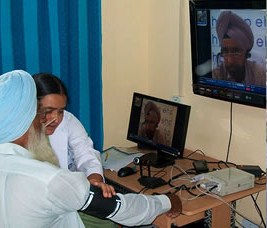Can HealthPoint model work in America


The idea is that its people will help HealthPoint scale its system, which depends on rural clinics and outreach by people using mobile phones. (Picture of a clinic from HealthPoint Services at globalhealthpoints.com.)
The phones will be able to conduct simple medical tests and collect Electronic Medical Record (EMR) data. Prescriptions and (when necessary) safe drinking water will be provided through the clinic network.
All this is the brainchild of Al Hammond, an entrepreneur who helps run an incubator called Ashoka dedicated to creating businesses that do good works.
The story pushed buttons in both the entrepreneur community and among liberal activists. Since HealthPoint will be a for-profit company, it can hopefully scale, which is something philanthropy has a tough time doing on its own.
Of more interest to me is whether this model could be applied to the U.S.
There are many places in America where health care is little better than in rural India. Even parts of my home town of Atlanta.
The traditional way to serve is for a charity hospital to open clinics. These don't scale, and many facilities, like Grady Hospital in Atlanta, have been cutting back on clinic hours.(This is true for their clinic in my neighborhood.)
The result is you're waiting for your customers to come to you, and then making them wait a long time before they get any service. That service, as a result, is emergency service and not wellness service.
An entrepreneurial model for outreach can change this. Having a para-professional, equipped with technology, going into the homes of poor people, collecting data, taking tests, and selling generic medicines directly, might actually work.
It's sort of an Amway model, only more systematized. The question is whether paranoia over privacy and the qualifications of the outreach staff would ever allow this to go forward.
India doesn't share those concerns. It's dealing with customers who have nothing save pride and a work ethic. How long will American pride stay its medical work ethic, I wonder.